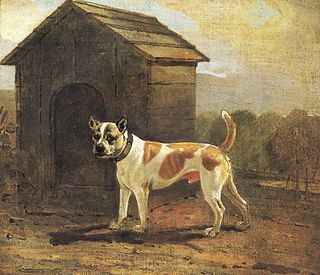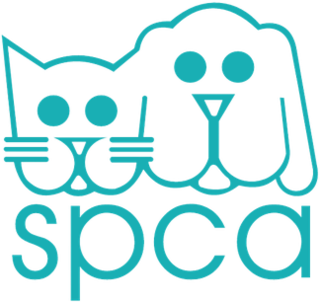The American Society for the Prevention of Cruelty to Animals (ASPCA) is a non-profit organization dedicated to preventing animal cruelty. Based in Ohio since its inception in 1866, the organization's mission is "to provide effective means for the prevention of cruelty to animals throughout the United States."

An animal shelter or pound is a place where stray, lost, abandoned or surrendered animals – mostly dogs and cats – are housed. The word "pound" has its origins in the animal pounds of the agricultural communities, where stray livestock would be penned or impounded until they were claimed by their owners.

An animal control service or animal control agency is an entity charged with responding to requests for help with animals, including wild animals, dangerous animals, and animals in distress. An individual who works for such an entity was once known as a dog catcher, but is generally now called an animal control officer, and may be an employee or a contractor – commonly employed by a municipality, county, shire, or other subnational government area.

The Canadian Eskimo Dog or Canadian Inuit Dog is a breed of working dog from the Arctic. Other names include qimmiq or qimmit. The Greenland Dog is considered the same breed as the Canadian Eskimo Dog since they have not yet diverged enough genetically to be considered separate breeds, despite their geographic isolation.

A doghouse, also known as a kennel, is an outbuilding to provide shelter for a dog from various weather conditions.
In some countries there is an overpopulation of pets such as cats, dogs, and exotic animals. In the United States, six to eight million animals are brought to shelters each year, of which an estimated three to four million are subsequently euthanized, including 2.7 million considered healthy and adoptable. Euthanasia numbers have declined since the 1970s, when U.S. shelters euthanized an estimated 12 to 20 million animals. Most humane societies, animal shelters and rescue groups urge animal caregivers to have their animals spayed or neutered to prevent the births of unwanted and accidental litters that could contribute to this dynamic.

The Royal New Zealand Society for the Prevention of Cruelty to Animals is a New Zealand charitable society who work to promote the humane treatment of animals. The society consists of 30 animal shelters and 6 vet partnerships around New Zealand, including many in regional areas. Under the Animal Welfare Act 1999, SPCA inspectors have the exclusive power to investigate animal welfare complaints and prosecute abusers when necessary. The Royal NZ SPCA has initiated a range of animal welfare campaigns. It has launched public education campaigns about the humane treatment of animals, and has encouraged people to change their behaviour towards animals. SPCA has also run advocacy campaigns aimed at promoting law changes or questioning the legality of certain practices.

The Society for the Prevention of Cruelty to Animals, Selangor is a non-profit animal shelter in Selangor, Malaysia. The SPCA Selangor was founded by Ruth Spiers in 1958.

The Society for the Prevention of Cruelty to Animals is a registered charity to promote animal welfare in Hong Kong, with outreach services to China.
A no-kill shelter is an animal shelter that does not kill healthy or treatable animals based on time limits or capacity, reserving euthanasia for terminally ill animals, animals suffering poor quality of life, or those considered dangerous to public safety. Some no-kill shelters will commit to not killing any animals at all, under any circumstance, except as required by law. A no-kill shelter uses many strategies to promote shelter animals; to expanding its resources using volunteers, housing and medical protocols; and to work actively to lower the number of homeless animals entering the shelter system. Up to ten percent of animals could be killed in a no-kill shelter and still be considered a no-kill shelter.

The Nova Scotia Society for the Prevention of Cruelty (Nova Scotia SPCA) is a not-for-profit charitable society organized under the Animal Protection Act of the Canadian province of Nova Scotia. The Society is dedicated to the prevention of cruelty to animals and to the promotion of respect and humane care for animals. Its members are committed to providing humane leadership in animal advocacy, protection, education, and veterinary care.

The Jamaica Dogsled Team is a team of sled dogs and mushers headquartered at Chukka Caribbean Adventures in Ocho Rios, located in Saint Ann Parish, Jamaica. The dog team is made up of strays rescued by the Jamaica Society for the Prevention of Cruelty to Animals and offers dryland dogsled rides, along with the adventure center's other outdoor experiences. In addition, the two mushers Newton Marshall and Damion Robb, compete in sled races throughout the US and Canada, using leased dog teams. Country music singer Jimmy Buffett's Margaritaville is the team's major sponsor.

Terry Lake is a former Canadian politician, at the municipal and provincial levels, and veterinarian.
The Richmond SPCA is an independent non-profit animal shelter in Richmond, Virginia, founded in 1891.
The British Columbia Society for the Prevention of Cruelty to Animals is a non-profit animal welfare organization which advocates for animal protection legislation, operates animal shelters, and runs educational workshops and public awareness programs throughout British Columbia, Canada. Founded in 1896, it is a registered charitable organization and one of the largest such animal welfare organizations in North America. As of 2017, BC SPCA had 36 branches, over 500 staff members, nearly 5500 volunteers, operated 5 veterinary hospitals/clinics and a wildlife rehabilitation centre, and sheltered more than 22000 animals. It is also one of the few animal welfare organizations to monitor animals in film.

National Council of Societies for the Prevention of Cruelty to Animals (NSPCA), also known as the National Council of SPCAs, is the largest and oldest animal welfare organisation in South Africa. The NSPCA handles all matters relating to animal cruelty involving all animal species and is a registered Non-Profit Organisation registered with the Department of Social Development.

Sled Dogs is a Canadian documentary film, directed by Fern Levitt and released in 2016. The film explores the Iditarod, raising allegations of animal cruelty among breeders, trainers and kennelers of the event's sled dogs. However, at least one dog keeper tried to obtain a legal injunction against the film's premiere at the Whistler Film Festival, alleging that Levitt had inaccurately depicted the actual dog care ethics of sled dog handlers, misrepresenting footage of an unethical commercial pet breeder rather than speaking to or filming companies actually involved in the care or training of sled dogs. A sled dog operator also filed a similar complaint with the Canadian Broadcasting Corporation after the film was broadcast on Documentary Channel in 2017, resulting in a report by CBC ombudsman Esther Enkin.

Fern Levitt is a Canadian-born animal activist, documentary producer and director. Her films focus on human rights, the Holocaust, discrimination against African-Americans in the US, animal welfare, and socially relevant issues. She is best known for her 2016 documentary Sled Dogs, which aired on the CBC Documentary channel. It explores the Iditarod, raising allegations of animal cruelty among breeders, trainers and kennelers of the event's sled dogs.












